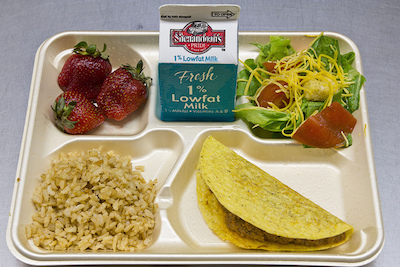Farm to School: Sourcing School Meals Locally
Education is more than what happens in the classroom. Students are learning about the world they live in, how to interact with each other, and how to stay healthy. People are becoming more environmentally aware and conscious of what children put in their bodies, particularly as awareness about obesity has spread.
School districts are starting to focus on something that impacts both student health and the environment they live in:
- The nutritional content of their school food
- The local content of their school food
In some cases, the availability of junk food at schools has made them co-conspirators in the development of unhealthy eating habits. Ignoring local food sources in favor of imported food only increases the environmental footprint of schools. Locally sourcing healthy lunch options for students is an excellent opportunity to develop nutritionally- and environmentally-conscious young citizens.
What Is the Farm to School Movement?
The USDA’s Farm to School Program is an effort to bring local food into schools to help students educationally and nutritionally, as well as to support the local economy. The USDA distributes about $5 million in grants each year to help schools connect to local producers and to bring students hands-on learning opportunities, such as farm visits, cooking classes and school gardens. The food isn’t limited to fruits and vegetables — local producers can be farmers, ranchers or manufacturers.
What is it?
“Farm to School” is both a federal term for a program and one applied to a movement that includes all efforts to introduce locally or even regionally produced food into the schools. This includes agricultural produce and even meat and poultry that goes into the meals students eat in the cafeteria. It also encompasses various hands-on learning opportunities. It is all part of an integrated approach to learning that extends beyond the classroom.
Benefits of the Farm to School Programs
When schools join the Farm to School movement, they are making connections that will have long lasting effects. This applies to both the children at the school as well as the farmers who produce the food. When schools source local food they find that children benefit in a number of ways. Farm to School programs provide:
- Fresher food that does not have to travel lengthy distances
- An educational connection between food and nutrition
- Healthy eating habits
- Educational opportunity for students and their families to make informed choices about their food
- A chance to learn more about the agricultural resources in their region
- Teachers a chance to teach students about agriculture, food science and other related topics
- A lesson in protecting the environment by decreasing a school’s environmental footprint
- A chance to learn about small-scale farming if a school garden is incorporated
Moreover, it is not only children and the education system that benefit. The local producers do as well. Research indicates that sourcing local or regional food helps growers, producers and others involved in the local food economy.
Solving a Problem without Creating Any New Ones
The Farm to School movement is one that works toward solving several problems: decreasing childhood obesity by instilling healthy eating habits, helping the local economy and encouraging environmental consciousness in students. With the potential to support local food producers and inspire the minds of children, this program does more than fill bellies with healthy food!
Photo: Locally-sourced school lunch served at a Washington, D.C. middle school. Credit: DC Central Kitchen / Flickr

